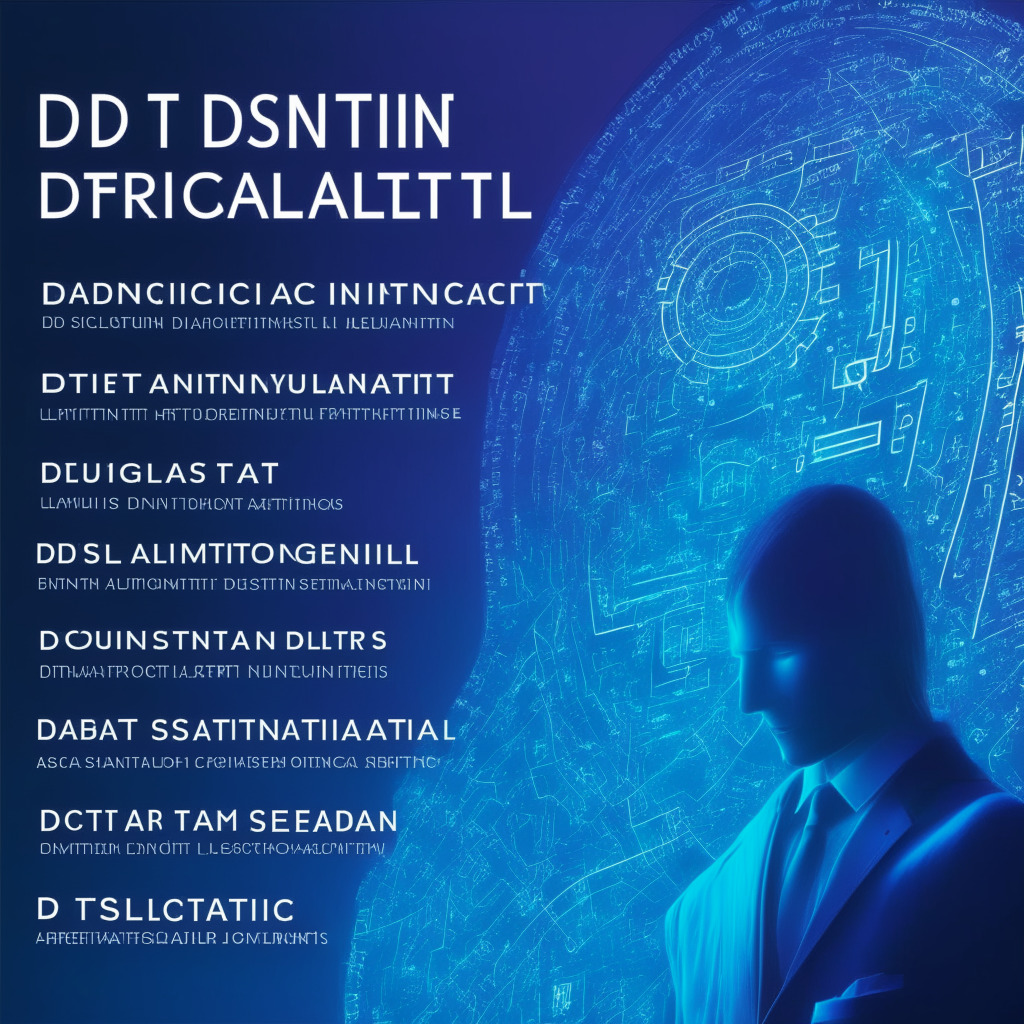Pro-XRP attorney John E. Deaton refutes claims made by Presidential candidate Ron DeSantis that the Biden administration could potentially kill Bitcoin, emphasizing the importance of politicians understanding cryptocurrency technology and its implications on the global financial landscape.
Search Results for: the Biden Administration
Navigating the Regulatory Maze: Driving Stablecoin Legislation Under Biden’s Administration
Chair Patrick McHenry of the US House of Representatives’ Financial Services Committee affirms his commitment to regulate stablecoins. He steers two digital asset bills targeted at stablecoin regulation, and bringing clarity to the role between the CFTC and SEC. McHenry highlights potential bipartisan support and the global influence of dollar-denominated stablecoins, emphasizing complex power dynamics beyond the digital asset scope.
Biden’s AI Cyber Challenge: Boosting Cybersecurity or Brewing a Hacker’s Playground?
“The Biden administration recently launched the AI Cyber Challenge. With $20 million in rewards, this initiative aims to protect critical American infrastructure from cybersecurity threats. It brings together AI titans such as Anthropic, Google, Microsoft, and OpenAI, seeking their innovative AI applications to enhance cybersecurity.”
Biden’s AI Summit: Balancing Innovation, Regulation, and Blockchain Implications
President Joe Biden is set to meet with AI experts to discuss the future of artificial intelligence and the need for legislation and guidelines. This comes at a time when the U.S. government has yet to establish a comprehensive strategy for AI development and cryptocurrency regulation, while Europe, China, and the United Kingdom have already made progress in these areas. The meeting aims to address concerns on policy, regulation, and balancing innovation with safety and risk mitigation.
Crypto Divide in 2024 US Presidential Election: DeSantis vs Biden on Bitcoin & CBDCs
Digital assets are becoming a significant topic in the 2024 U.S. presidential election, with Florida Gov. Ron DeSantis championing a pro-crypto stance while critics accuse the Biden administration of hindering crypto growth and advocating for CBDCs. The debate’s potential influence on the election is still uncertain.
Biden’s 30% Bitcoin Mining Tax: Balancing Environmental Concerns and Industry Growth
Senator Cynthia Lummis strongly opposes the Biden Administration’s proposal for a 30% tax on electricity for Bitcoin miners. Critics argue this could drive the industry offshore, while supporters claim it addresses environmental concerns. The debate highlights complexities in regulating the digital asset industry and balancing consumer protection, sustainability, and innovation.
G7 Fallout: Biden Slams Crypto Traders, Tax Cheats, and Republican Backers Amid Budget Talks
U.S. President Joe Biden criticized wealthy tax cheats and crypto traders at the G7 forum in Japan, while discussing budget negotiations and the risk of debt default. His administration aims to modernize rules for digital assets and ensure a fair financial ecosystem without compromising innovation.
Biden’s Stance on Crypto Taxes: Unmasking the Divide in the US Debt Crisis Debate
During the G7 talks, President Joe Biden declared the proposed budget terms as “unacceptable,” arguing that protecting tax-loss harvesting strategies for crypto traders risks food assistance for Americans. This controversy highlights the growing divide between the White House and Republican leaders, with ongoing negotiations surrounding US debt crisis and tax-related loopholes putting the country’s financial future in debate.
G7 Summit: Biden’s Crypto Opposition & Debt Ceiling Debate – Tax Implications & Future Regulation
At the G7 summit, President Joe Biden opposed a debt ceiling agreement allegedly favoring crypto traders through tax-loss harvesting, calling the terms “unacceptable.” The controversy highlights the need for a comprehensive regulatory framework addressing traditional finance and emerging technologies like blockchain and digital assets.
Biden’s Proposed 30% Bitcoin Mining Tax: Impact on National Security and Clean Energy
Sen. Cynthia Lummis addressed concerns over President Biden’s proposed 30% excise tax on Bitcoin miners, stating it could negatively impact both Bitcoin mining and national security. Although lawmakers remain skeptical due to criminal activity associations, Lummis emphasizes the importance of promoting Bitcoin mining in the US for energy security and potential environmental advantages.
Biden’s 30% Crypto Mining Tax: Innovation Killer or Eco-Friendly Move? Pros & Cons Explored
Senator Cynthia Lummis opposes the proposed 30% tax on cryptocurrency miners in the Biden Administration’s budget for 2024, citing environmental benefits. The proposed tax has sparked debates surrounding innovation, blockchain development, and consumer protection, with concerns it may hinder cryptocurrency adoption in the US.
Biden’s Crypto Mining Tax Faces Industry Backlash: Impacts and Alternatives Explored
AIER criticizes President Biden’s Council of Economic Advisors’ proposed 30% Digital Asset Mining Energy tax on crypto mining as misguided, arguing it doesn’t encourage electricity usage reduction and could shut down US-based bitcoin miners. Experts suggest taxing electricity generation itself instead.
Biden Targets Crypto Tax Loopholes: Fact or Fiction? Understanding the Debate and Its Impact
President Joe Biden recently called for an end to alleged tax loopholes assisting wealthy crypto investors, without providing specifics regarding such loopholes or reforms. The crypto community responded skeptically, highlighting the smaller size of the crypto market and questioning the existence of these loopholes. Speculations suggest possible connection to the IRS wash sale rule.
Biden’s Crypto Tax Proposals: Balancing Innovation vs. Financial Fairness Debate
As President Biden proposes tax code updates for crypto assets in his fiscal year 2024 budget, critics argue that the U.S. should support the growing technological and financial revolution of cryptocurrency. Meanwhile, concerns over unclear regulatory guidance and a proposed 30% excise tax on crypto miners’ energy consumption intensify the debate on cryptocurrency regulation and innovation support.
RFK Jr. Challenges Biden’s Crypto Stance: Privacy, Taxation, and CBDC Concerns Unveiled
Robert F. Kennedy Jr. criticizes President Biden’s 30% tax on crypto mining and expresses concerns over government control on bank accounts and payment platforms. He opposes central bank digital currencies, arguing they could be used to subdue dissent by cutting off access to funds.
Biden’s Blockchain Focus: Digital Identity, DLT Advancements, and Balancing Privacy
The US government has emphasized the development of critical and emerging technologies, including digital identity infrastructure and distributed ledger technologies (DLT). As blockchain gains significance in the economic landscape, challenges arise in balancing innovation and privacy, while aiming to bolster US competitiveness and maintain a secure digital environment.
Crypto Miners Unite: The Digital Energy Council Paves Way Amid Regulatory Tumult
The Digital Energy Council, an alliance of crypto miners, is seeking to influence U.S. policy for friendlier laws on sustainable energy development and grid resilience. However, their goals clash with the Biden administration’s stance, including a proposed 30% tax on mining operations for environmental concerns.
Miami Mayor Launches Presidential Bid accepting Bitcoin Donations Amid CBDC Criticisms
“Miami Mayor Francis Suarez, a champion of cryptocurrencies, announced his presidential campaign will accept Bitcoin donations. Suarez criticized the Biden administration’s cryptocurrency management and expressed disdain for the concept of central bank digital currencies, pledging to ban them if elected. Despite setbacks, he continues emphasizing the importance of crypto familiarity in government leadership.”
DeSantis’ Crypto-Friendly Stance: A Beacon for Blockchain Innovation in 2024 Election
Ron DeSantis’ presidential campaign announcement highlights his pro-crypto stance, emphasizing personal freedom and economic sovereignty. As he criticizes centralized digital currencies, DeSantis positions himself as an influential crypto-friendly figure in contrast to the Biden administration’s regulatory approach. The crypto community seeks leaders like DeSantis, who understand cryptocurrency’s complexities and potential.
The Great AI Debate: Balancing Innovation, Risks, and Collaborative Safeguards
The meeting between U.S. Vice President Kamala Harris, President Biden’s advisors, and AI industry CEOs discussed potential risks posed by AI technology, emphasizing shared responsibility between governments and companies in risk mitigation. Topics covered transparency, safety evaluation, and protection from malicious actors. The Biden Administration allocated $140 million to National AI Research Institutes, and White House plans to release a draft policy on government usage of AI.
DAME Tax Debate: Balancing Crypto Mining’s Environmental Impact and Industry Growth
The Digital Asset Mining Energy (DAME) tax proposed by the Biden administration aims to make crypto miners pay for environmental impacts, sparking debate on its fairness. Critics argue the tax overlooks renewable energy sources, technology advancements, and potential environmental benefits provided by mining. Open discussions could help develop a balanced, viable solution for sustainable industry growth.
2024 Presidential Race: RFK Jr.’s Impact on Crypto Policy and CBDC Debate
2024 presidential race candidate Robert F. Kennedy Jr. criticizes the Biden Administration’s proposal for a 30% tax on cryptocurrency mining, arguing it hinders industry growth and stifles innovation. Kennedy also accuses U.S. financial regulators of waging “an extra-legal war on crypto” and opposes Central Bank Digital Currencies as mechanisms for social surveillance and control.
Crypto Mining Tax: Balancing Environmental Impact and Industry Growth
The Biden administration proposes a 30% tax on crypto mining firm’s energy costs, aiming to counter environmental pollution, higher energy prices, and increased greenhouse gas emissions. However, this industry-specific penalty could impact profits and faces resistance from congressional Republicans.
Divisive Lines: How SEC’s Gensler Grapples with Criticisms & Questions on Crypto Oversight
Gary Gensler, SEC Chair, recently faced criticism over cryptocurrency market monitoring. Critics accused him of stifling markets with excessive regulation, promoting a “woke” agenda, and lacked certainty in classifying Bitcoin. The future of cryptocurrency regulation remains a divisive topic among industry participants and lawmakers.
Bitcoin and Bureaucracy: Can a US Government Shutdown Ignite a Cryptocurrency Bull Run?
Marcel Pechman investigates the impact a potential U.S. government shutdown could have on Bitcoin, suggesting that an imbalance in wealth, rising consumer fear over escalating prices, and the possibility of inflation exceeding income growth could impose downward pressure on the cryptocurrency. Despite this, the shutdown could also spark a Bitcoin rally.
The Tug of War: The U.S.’s Potential Leap into Digital Currency vs Fears of Surveillance
The U.S. House of Representatives is considering the introduction of a Central Bank Digital Currency (CBDC), amidst contrasting views. Democrat Rep. Stephen Lynch calls for a pilot project for a digital dollar, stressing it is “absolutely critical” for the U.S. to show leadership in digital currency development. However, concerns remain regarding transaction management, tracking, and potential regulatory limitation issues.
Crypto’s Journey through the Labyrinth of US Law: Struggles, Triumphs, and Future Projections
“In just a half decade, the digital assets industry has seen significant evolution. Despite challenges caused by regulatory scrutiny, anti-money-laundering concerns, and varying political views, the adoption trend for crypto continues to rise. The anticipated regulatory changes and upcoming elections, particularly in 2024, present an opportunity for a fresh perspective on digital assets’ development and use.”
Texas Mining Clampdown and Bitcoin’s Turbulence: Is $20K the New Norm?
“The escalating energy crisis in Texas has led to a suspension of Bitcoin mining, pushing Bitcoin’s price down to $25,900. This event, along with weakening prices, increased rivalry, and reduced returns post-halving, creates challenges for the mining sector. Despite the current scenrio, crypto enthusiasts anticipate a promising 2023, mixed with risk and volatility.”
Tencent’s AI Leap Amidst US-China Tensions: Breaking Down the Hunyuan System
“Tencent has introduced its ‘Hunyuan’ AI system, a multimodal large language model similar to OpenAI’s ChatGPT. The system supports functions like image creation, text recognition, and customer service, and can contribute to sectors such as finance, social media, and e-commerce.”
Navigating The Storm: New Regulatory Frameworks on AI and Crypto Chip Exports Stir Global Markets
“Regulatory frameworks globally are revising their stance on ASIC chip exports, pivotal in cryptographic technologies. The U.S. Department of Commerce denies prohibiting AI chips sale to the Middle East. However, new regulations require tech giants to get licenses for selling flagship chips to some Middle Eastern countries.”
Grayscale’s Victory Stirs Up Controversy: Doubts Over SEC’s Gensler Heighten
“Cryptocurrency circles discuss Grayscale’s lawsuit and SEC chair Gary Gensler’s role. Congressman Warren Davidson suggests Gensler’s SEC decisions lack stead, as demonstrated by Grayscale’s legal victory. This opens up possibilities for a Bitcoin spot ETF emergence in the US, but the situation remains uncertain.”
Miami’s Blockchain Mayor Bows Out: What Suarez’s Presidential Campaign Suspension Means for Cryptocurrency Future
“Suarez, Miami’s Mayor, known for his bitcoin-friendly stance, accepted bitcoin as campaign donation and has explored the use of blockchain technology. Despite facing challenges, his pursuit of these technologies prompts discussion on the role of digital currencies in future political campaigns and public administration.”






























